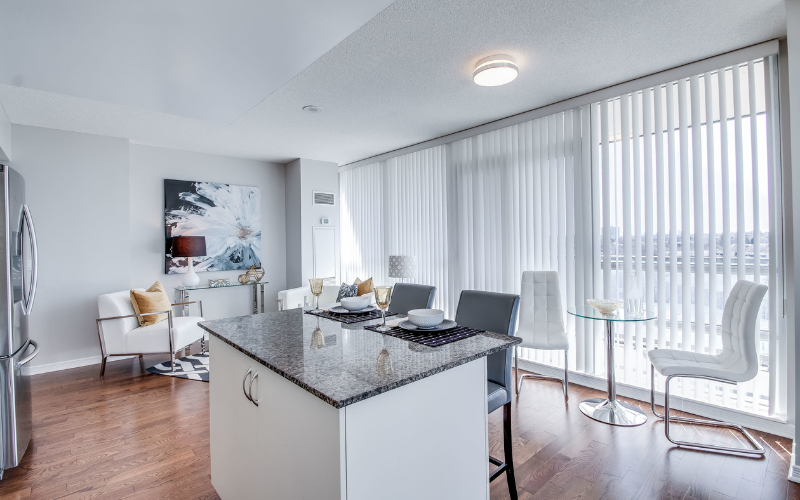If you’re buying a home, you will quickly find there is a lot of lingo and terms your real estate agent or lender will use. As a first-time home buyer or seller, you might find yourself wondering what sellers concessions are.
You will hear this word thrown around by your lender, your real estate agent, or you might stumble across it while reading an article on a popular real estate blog.
Other terms you will see or hear, although less common, are as follows:
- Seller’s assist or seller’s assistance
- Seller to credit buyer
- Seller subsidy
- Seller credit
All of these terms are meant to capture the same idea. In simple terms, a seller’s concession, subsidy, or assistance, is an amount of money paid by the seller to the benefit of the home buyer at closing.
Depending on the loan type, offer price, and deal negotiated, a seller can pay some or all of a buyer’s closing costs.
A seller’s concession can help home buyers reduce the overall upfront cash required at closing. In other words, it provides cash-strapped home buyers an opportunity to buy a home with less money upfront than if they paid for all of their own closing costs.
This comprehensive guide on seller’s concessions will focus mostly on home buyers and how to get a seller to pay for closing costs. If you’re curious about the implications as a home seller, skip to the bottom of this article.
OUTLINE TITLE TAGS
What Are Sellers Concessions?
Real estate concessions happen during the negotiation process, whereby a seller or buyer gives something to the other party. It is possible to give buyer’s concessions, which we discuss at the bottom of this guide.
However, it is most common to negotiate for seller’s concessions. Often as a real estate agent, I take for granted and assume a certain level of knowledge. If you’re not a real estate, lender, or title processor, you’re probably unfamiliar with the term seller’s concessions, subsidy, or assist.
Generally, seller’s concessions are when a home seller agrees to pay for some or all of your closing costs. Most often it is expressed as a percentage of the home’s value, but it could also be a fixed dollar amount.
For example, a lender has an origination fee of one percent of the mortgage value. Let’s say you want this fee covered, so you ask the seller to give you a credit of one percent of the mortgage value or the offer price.
Looking at some specific numbers, let’s say you’re buying a $400,000 home and you want to ask for three percent seller’s concessions. At closing the seller will credit you $12,000 to use on closing costs.
But, what closing costs can concessions actually pay for?
Closing Costs Sellers Concession Pays For
Seller’s concessions are used by buyers to help pay for closing costs associated with purchasing a home, such as lender fees or real estate agent fees.
Let’s look at some of the closing costs seller’s concessions can pay for.
- Discount Points: these are fees paid to the lender to reduce your interest rate.
- Loan Origination Fees: lender fees charged for getting a mortgage.
- Property Taxes: Depending on local practice, property taxes are calculated in arrears or advance. This can result in a fee to the buyer, which can be covered by seller’s assistance.
- Recording Fees: these are fees associated with county or state recording fees. They are usually small, minimal fees.
- Title Insurance: title insurance protects the lender and homeowner in the event of any title issues after closing.
Some other potential fees — although rarely — that concessions could cover are appraisal fees, home inspection fees, and credit reporting fees.
Often these expenses aren’t covered by a seller’s credit because lenders and home inspectors often require payment upfront for these services.
Generally, potential home buyers are expected to pay appraisal fees, credit reporting fees, and home inspection fees prior to closing on a property. In total, these costs typically range from $800 to $1,200.
By law, lenders are required to provide potential home buyers with a loan estimate. The loan estimate details closing costs associated with a loan and the purchase of a home.
Make sure to review the document and share it with your real estate agent. This can help you determine the amount of seller concession to ask for.
Keep in mind that the loan estimate is only an estimate. It can be off, so be prepared for any differences when it comes time to close on the property. You want to make sure you have sufficient cash to close on the property.
How Do I Add Concessions To An Offer?
Okay, so you’ve determined you would like assistance from the seller when it comes to some of your closing costs. The next question is, how do you add concessions to an offer and get it accepted?
Let’s look at some of the different aspects that will affect whether or not a seller agrees to provide concessions.
Real Estate Market Type
The current real estate market will have a direct affect on your success at getting seller’s concessions. In a seller’s market, typically defined as an absorption rate less than four months and where the supply is less than demand, buyers are less likely to get any seller’s assistance.
In fact, many home buyers are discouraged from asking for any concessions if they want to give their offer the best chance of being accepted.
Hot real estate markets, like those seen in 2021 and 2022, often result in bidding wars and multiple offer situations. Asking a seller to pay for closing costs can get their offer moved to the bottom of the pile and often rejected.
On the opposite spectrum is a buyer’s market. This kind of market, like those seen during the great recession, is typically characterized as an absorption rate above six months and where supply is higher than the demand.
In these kinds of markets, buyers are extremely successful at asking for seller’s concessions. It’s even common for sellers to offer some form of concessions in the listing description.
During a buyer’s market, the home buyer is in the driver’s seat and sellers will often do whatever they can to attract home buyers and get their home sold.
Perception and Fear
I’m a big believer in the importance of market psychology, fear, and perception. Sometimes, despite the data, the market reacts counter to reality.
By definition, the real estate market is considered a seller’s market in 2023. However, rising interest rates, the fear of a recession, and a stock market decline have many sellers adjusting their expectations.
It’s important to understand that perception and fear play a part in getting your offer accepted and asking for concessions. The real estate market is only one data point that influences a seller’s perception.
When fear is high about the long-term outcome of the real estate market, seller’s are more likely to offer concessions. For example, they may become interested in selling their property “before the market crashes”.
Demographics
Demographics and home values also play a role in getting seller’s concessions. If you mapped home values along a distribution curve, you would find those on the lower portion of the curve are more likely to have seller’s concessions, regardless of the market conditions.
For example, let’s say you live in a community where the average home value is $300,000. The lower 10 percent of homes cost around $100,000. It’s likely, although not always, these homes are see offers with seller’s concessions.
In a competitive situation, it’s likely all offers submitted would ask for seller’s concessions.
Make A Better Offer
A real estate offer is more than concessions. There are a lot of different terms you can negotiate, but the most common practice is to increase the offer price.
However, it’s possible to make your offer better by closing faster, reducing contingencies, or the mortgage type.
There are a lot of different variables that go into making a great offer, so be sure to work with an experienced, local real estate agent.
Who Pays Seller’s Concessions?
It’s important to bring up a topic that is sometimes controversial and one I get flack from when talking to other real estate agents. This is my personal opinion and I will explain with logic.
It is always the home buyer who really pays for seller’s concessions at the end of the day.
While it shows up as a credit from the seller, the money really comes from the pocket of the home buyer. That’s because seller’s concessions are always added back to the price of the home.
A seller has a net profit amount they are willing to accept. So, when you ask for concessions and the offer is accepted, the fact is you likely could have made a lower priced offer with no concessions.
For example, assume you make an offer on a house for $325,000 with $5,000 in concessions. The seller accepts your offer to pay some of your closing costs.
In this situation, the seller would have likely accepted $320,000 with no concessions because the net profit to the seller will be nearly the same. There are slight differences in costs and the net profit isn’t exactly, but often the differences are rather negligible.
So, a majority of the time, seller’s concessions are paid for by the buyer and often financed into the mortgage. On a conventional loan with 20 percent down, every $1,000 in seller’s concessions added to the offer price would result in $200 of additional down payment and $800 being financed.
If you’re purchasing a home in Michigan, instead of asking for seller’s concessions, it may be a better deal to look for buying a home using MSHDA down payment assistance. The MSHDA DPA program can provide buyers with down payment and closing costs assistance.
Sellers Concessions Limits
There is a limit to how much the seller can contribute to closing costs. Even if a seller was willing to pay 100 percent of your closing costs, it may not be possible.
The seller’s concession limit is determined based on your loan type — conventional, FHA, VA, or USDA.
Let’s look at some of the limits. First, sellers are not allowed to give concessions more than the entire closing costs. For example, if your closing costs are $9,000, then the seller cannot give you $10,000.
We’ll talk shortly about what happens when closing costs come in less than what you asked for and got accepted.
First, I wanted to discuss why these rules are in place. Fannie Mae and HUD set contribution limits to avoid adding upward pressure to the housing market.
Fannie Mae Seller Concessions Limit
The goal of max contribution limits is to avoid inflationary prices on the housing market. Sort of like what happens when interest rates fall.
We saw this in 2021 and into 2022 when mortgage rates approach all-time lows. The low interest rates made monthly housing payments affordable.
As a result, the housing market became competitive, prices were pushed up to win and all of it was allowed because interest rates created low monthly payments.
So, Fannie Mae seller concessions are the most favorable of all the loan types. That’s because Fannie Mae and Freddie Mac often purchase conventional or conforming mortgages.
The limits seen on Fannie Mae loans are what you see on a conventional loan.
Conventional Loan Limits
On a conventional loan, the limit for seller’s concessions varies depending on the down payment amount, with exception to investment properties.
The limits are the same for second properties, first-time home buyers, and repeat home buyers. A greater down payment allows the seller to provide a larger credit to buyers.
According to Fannie Mae’s website, their limits are as follows:
- Less than 10 percent down payment: the max seller’s contribution limit is 3 percent of the property’s sale price.
- Between 10 percent and 25 percent: a seller can contribute as much as 6 percent of a property’s sale price.
- Greater than 25 percent: Seller’s concession limits are as high as 9 percent of the sale price.
Investors are limited to 2 percent seller’s concessions regardless of the down payment.
When using a conventional MSHDA loan, there have been cases where a buyer was able to push the down payment up above 10 percent and secure an additional amount in seller’s concessions.
Contribution Limits FHA Loans
The max FHA seller concession limits are lower than conventional loans and do not differ based on the down payment. Regardless of the down payment, a seller can only contribute up to 6% of the sale price.
It is a good idea to work with your lender to determine your best loan options. The typical down payment on an FHA loan is 3.5 percent. If you made a similar down payment on a conventional loan, your seller’s contribution limits would be three percent.
On the basis of seller’s concessions, it seems like an FHA loan would be a better option if you have a low down payment.
However, work with a good lender to understand all of the costs associated with various loans such as interest rates and private mortgage insurance.
Contribution Limits VA Loan
VA loans have a 4 percent seller’s concessions limit. Since VA loans are different from conventional and FHA loans, there are a few more things seller’s concessions can pay for.
For example, concessions can cover VA funding fees, debts, and buyer’s judgments. As a veteran, it is important to understand the different uses of the VA loan, the benefits and the disadvantages.
Contribution Limits USDA Loans
The max contribution on a USDA loan is 6 percent of the mortgage value. Every other loan type bases the contribution limit on property’s sale price.
Given that many USDA loans offer a zero percent down option, you can end up getting more seller’s concessions than a lower down payment option like an FHA loan and easily beat out a conventional loan.
There are different requirements for a USDA loan and not every home will qualify for the use of a USDA loan.
Seller’s Concessions For MSHDA Loans
MSHDA loans are not loans by themselves. Rather, they are a down payment assistance program. As a result, the maximum contribution in a seller’s concession on a MSHDA loan is based on the loan type the buyer has — either conventional or FHA.
The maximum contribution will follow the limits of the conventional loan or FHA loan.
Seller’s Concessions Greater Than Closing Cost
A majority of the time, seller’s concessions do not cover 100 percent of the closing costs. This is especially true for home buyers using a FHA, USDA or VA loan since these loan types have lower max contribution limits.
Every so often though, usually with a conventional loan, the agreed upon seller’s concessions are greater than the closing costs.
Mortgage rules dictate that seller’s concessions can’t be greater than the closing costs. There are two options, therefore, when concessions are greater than closing costs.
- Reduce Seller’s Concessions
- Increase Closing Costs
First, the obvious option is to reduce the seller’s concession. Often it means going back to the seller and renegotiating the sale price to a lower value.
Obviously, you don’t want to simply reduce seller’s concessions. That would be giving the seller back money that they have agreed to give you.
Since they already agreed to a certain net profit amount, the goal is to get them to lower the sale price by the amount we’re reducing concessions.
Our second choice is to increase our closing costs. I know, this sounds weird and dumb. Why the heck would you want to increase your closing costs?
One option is to add discount points, if possible, to the mortgage. This will increase your closing costs and allow you to buy down your interest rate.
This choice would save you some money every month by reducing your monthly mortgage payment.
Frequently Asked Sellers Concessions Questions
Can Sellers Concessions Be Used For Down Payment?
No, a seller’s concessions cannot be used to assist a homebuyer with their down payment. If you are looking for a down payment assistance program, check out our guide on MSHDA loans. This is a great program that can provide first-time home buyers up to $10,000 in down payment assistance.
Seller’s Concession Vs Price Reduction?
As far as which is better, it really depends on your cash position prior to closing. For me, personally, I would rather have a price reduction than seller’s concessions.
It requires more upfront cash at closing, but it reduces my overall closing costs and my monthly mortgage payment. I’d rather make the upfront payment and reduce my overall costs in the long-term.
However, it’s really personal preference and if you need concessions to close on a home, then pick concessions over a price reduction.
Can Seller Concessions Be Used For Repairs?
Seller’s concessions can be made for repairs or improvements to a property. Sometimes a property inspection brings up some repairs that weren’t seen when initially touring the house prior to making an offer.
A seller can give concessions to make repairs after closing. Many buyers prefer this so they can choose their own contractors.
You could make a seller complete the repair, but you don’t if they are just going to go with the lowest quality solution.
An alternative solution for repair requests is to reduce the home’s purchase price. Whether you can get a credit from the seller for repairs depends on the type of market.
Is Sellers Concessions A Good Idea?
I try to stay away from the moralistic questions of whether seller’s concessions are a good idea. The answer is that it really depends on your situation. A good real estate agent will help you evaluate this question.
Also, this question assumes specific variables we measure against. For example, when people ask this question, they are often wondering if it is a good financial decision.
But, life is more than finance and money. If we all followed good financial decisions, then we would buy less than we can afford, minimize mortgage length, and put as much down as we can.
Life is sometimes about tradeoffs. Only you and your agent can help you decide if seller’s concessions is a good idea.
For Sellers
Sometimes sellers want to know if they should accept an offer on seller’s concessions. The answer to the question is based on calculating the net profit or proceeds.
Every seller should focus mostly on the net profit.
Offers can be structured in different ways, with or without concessions, and result in similar net proceeds to the seller.
For example, a $275,000 offer without concessions nets roughly the same as a $280,000 offer with $5,000 in concessions.
When in doubt, have your real estate agent run a detailed net proceeds sheet. There are some subtle proceed differences in the above two offers since some costs are tied to the sale price, such as title fees, transfer taxes, and real estate agent fees.
Can buyers make Concessions?
In the real estate industry, we often only refer to seller’s concessions, but don’t forget that buyer’s can make concessions, too.
For example, in a seller’s market, home buyers may allow the seller to live in the property rent free for a few weeks or months after closing.
This is an example of a buyer’s concession.
Final Thoughts
Seller’s concessions can make buying a house more affordable. It provides an opportunity for cash-strapped home buyers to get into a home sooner.
Talk with your lender and real estate agent about your options for getting seller’s assistance, concessions, or subsidy. Each loan type has different contribution limits and the current real estate market will influence your success at getting seller’s concessions.
Seller’s concessions are used to pay your closing costs and can be used to reduce your overall interest rate and mortgage payment. With rising interest rates, asking for seller’s concessions to reduce the interest rate through discount points could be a good idea for some.
With a better understanding of how seller’s concessions work, it’s time to think about the kind of offer you want to write. Good luck and happy house hunting!




